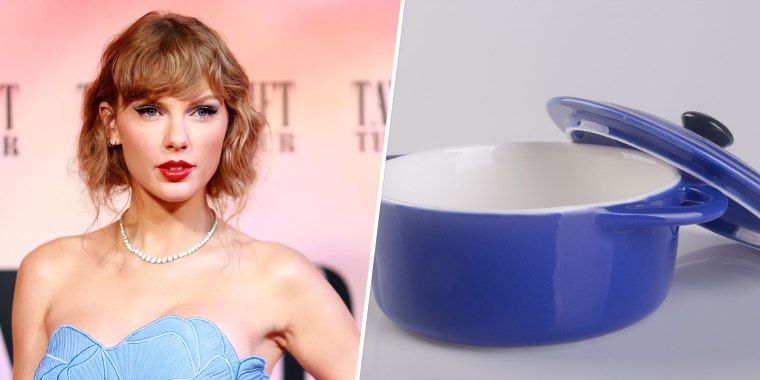Hopefully, social media users who saw Taylor Swift promoting free cookware on platforms like Facebook knew the ads were trouble before they clicked in.
Fake advertisements for the cookware brand Le Creuset, appearing to feature Swift’s stamp of approval, have appeared on Facebook and other social platforms in recent weeks. The advertisements use strewn-together clips of the singer with a synthesized version of her voice and images of Le Creuset Dutch ovens.
“Hey y’all, it’s Taylor Swift here,” a fake advertisement featuring Swift’s augmented voice begins. “Due to a packaging error, we can’t sell 3,000 Le Creuset cookware sets. So I’m giving them away to my loyal fans for free.”
The ad then instructs users to click on a button and answer questions in order to receive the brand’s free cookware.
The comments section of the Facebook post featuring Swift’s voice highlighted the various methods that the creators of the false ad used to legitimize the “giveaway.”
“Get in 10 days! Long waiting but anyway the set is great! Thank you guys!!” one account commented.
But other users were quick to jump in and call out the advertisement for being false while also sharing their experience with falling for the advertisement.
“I paid the shipping, stupidly, and never received the cookware,” one user commented. “Shame on me for falling for it. Don’t do it!”
Representatives for Swift did not immediately respond to a request for comment, while a spokesperson for Meta tells TODAY.com that the ad has been removed.
“Le Creuset is not involved with Taylor Swift for any consumer giveaway,” a spokesperson for Le Creuset told NBC News. “All approved Le Creuset giveaways or promotions come from the official Le Creuset social accounts. Consumers should always check Le Creuset’s official social accounts and website before clicking on any suspicious ads.”
Dr. David S. Touretzky, a research professor at Carnegie Mellon University’s Computer Science Department & Carnegie Mellon Neuroscience Institute, tells TODAY.com that the Le Creuset scam only faked Taylor Swift’s voice.
“The images it used were real,” he explains. “Faking images is possible but requires a lot more work.”
The fake Le Creuset advertisement is far from the first to use artificial intelligence to fake a celebrity’s face or voice for scamming purposes.
Similar scam ads on Facebook show Oprah Winfrey also promoting the cookware giveaway. In November 2023, Scarlett Johansson and her legal team went after Lisa AI, an AI art generator and avatar maker, for using her likeness for online advertisements.
As troubling as these campaigns can be, Touretzky underscores that before deepfakes arrived, people would hire voice impersonators to pull off similar scams.
“But finding people who could both do that well and were willing to facilitate a crime might be difficult. Using computers is easier because they have no morals and won’t rat you out to the authorities,” he continues.
How are deepfake models trained?
Touretzky explains that in order to fake someone’s voice, samples of their speech need to be collected. With Taylor Swift having been everywhere this year, bad actors certainly had plenty of content to pull from.
“You use this as training data for a machine learning algorithm that builds a model of their speech patterns: their pronunciation, intonation, voice timbre, speaking rhythm,” he explains. “Using that model, you can take speech from someone else and transform it so that it sounds like the person you’re trying to imitate.”
How can we protect against deepfakes?
Touretzky notes that there’s no rewinding the clock on deepfake technology.
“The technology isn't going back in the bottle,” he says. “If anything, as computers get more powerful, it will become even more widespread. Maybe in a year or two, you’ll be able to get an app for your phone that lets you speak like Morgan Freeman or Dame Judi Dench.
“Catching people who misuse the technology will have to rely on better ability to trace where the money goes,” he says.

